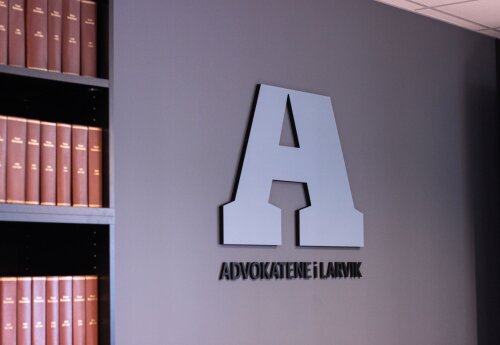Best Merger & Acquisition Lawyers in Norway
Share your needs with us, get contacted by law firms.
Free. Takes 2 min.
Or refine your search by selecting a city:
List of the best lawyers in Norway
About Merger & Acquisition Law in Norway
Merger & Acquisition (M&A) law in Norway is a dynamic and intricate field, comprising regulations and practices that govern the amalgamation of businesses and acquisition of companies. Norwegian M&A transactions are influenced by various legislation that aims to ensure fair competition and protect stakeholders’ interests. The primary legal framework includes the Norwegian Companies Act, the Securities Trading Act, and the Competition Act. These laws work in conjunction to oversee the acquisition process, to safeguard shareholder rights, and to regulate competitive practices within the market.
Why You May Need a Lawyer
There are several scenarios in which seeking legal advice for M&A transactions in Norway is beneficial:
- Conducting due diligence investigations to identify potential risks and liabilities before a transaction.
- Negotiating terms and conditions of the transaction agreement to protect your interests.
- Ensuring compliance with applicable Norwegian and EU regulations, including antitrust laws.
- Drafting and reviewing key documents such as share purchase agreements, confidentiality agreements, and merger plans.
- Representing your interests in negotiations and, if necessary, in litigation.
Local Laws Overview
Several key aspects of Norwegian law are particularly relevant in M&A transactions:
- Companies Act: Governs the structure, management, and dissolution of companies in Norway.
- Securities Trading Act: Regulates the handling of financial instruments and provides rules on public offers, disclosure of substantial shareholdings, and more.
- Competition Act: Overseen by the Norwegian Competition Authority, this law ensures that M&A activities do not stifle competition in the Norwegian market.
- Corporate Tax Laws: Tax implications can significantly affect the value proposition of M&A deals.
Frequently Asked Questions
What is the general process for mergers and acquisitions in Norway?
The process typically involves initial evaluations, due diligence, negotiation of terms, formalizing the agreement, seeking regulatory approvals, and finally, the integration of acquired assets.
Is regulatory approval required for all mergers and acquisitions in Norway?
Not for all. However, transactions that exceed specific thresholds in terms of market share or revenues may require approval from the Norwegian Competition Authority.
What are the primary considerations in M&A transactions?
Key considerations include the strategic rationale, due diligence findings, regulatory requirements, valuation, and financing options.
How are cross-border M&A transactions handled?
Cross-border transactions are subject to both Norwegian laws and the laws of the jurisdiction where the foreign entity is located, often requiring coordination between legal experts from different countries.
Can shareholders block a merger or acquisition?
Yes, shareholders generally have rights to approve or reject significant corporate transactions, depending on the corporate governance rules of the company.
What role do due diligence processes play in M&A?
Due diligence is critical for identifying potential legal, financial, and operational risks, enabling informed decision-making and negotiation processes.
What are earnouts, and how are they used in M&A deals?
Earnouts are provisions in M&A agreements where a portion of the purchase price is contingent on the achievement of future performance targets.
Is there a requirement for public disclosure of M&A transactions?
Yes, publicly listed companies are generally required to announce acquisitions and mergers. Private companies may have fewer disclosure obligations.
How is employee consent managed in M&A transactions?
Employee rights and consultations must be considered according to Norwegian labor laws and collective agreements. In some cases, acquiring companies may need to offer equivalent employment terms.
What are common methods to finance an M&A transaction?
Financing options include cash reserves, stock swaps, loans, or a combination thereof, depending on the financial strategy and liquidity of the acquiring company.
Additional Resources
If you need further information or assistance, consider reaching out to the following resources:
- Norwegian Competition Authority
- The Norwegian Financial Supervisory Authority
- Professional legal associations such as the Norwegian Bar Association
- Reputable law firms with expertise in corporate and M&A law
- University programs offering courses in Norwegian business and corporate law
Next Steps
If you require legal assistance with M&A in Norway, consider the following steps:
- Identify reputable law firms specializing in M&A and corporate law in Norway.
- Schedule consultations to discuss your specific needs and objectives with legal experts.
- Gather and organize all pertinent documentation and data related to your M&A interests.
- Seek recommendations from industry contacts or professional networks.
- Choose a legal partner who understands both your industry and the Norwegian legal environment.
Lawzana helps you find the best lawyers and law firms in Norway through a curated and pre-screened list of qualified legal professionals. Our platform offers rankings and detailed profiles of attorneys and law firms, allowing you to compare based on practice areas, including Merger & Acquisition, experience, and client feedback.
Each profile includes a description of the firm's areas of practice, client reviews, team members and partners, year of establishment, spoken languages, office locations, contact information, social media presence, and any published articles or resources. Most firms on our platform speak English and are experienced in both local and international legal matters.
Get a quote from top-rated law firms in Norway — quickly, securely, and without unnecessary hassle.
Disclaimer:
The information provided on this page is for general informational purposes only and does not constitute legal advice. While we strive to ensure the accuracy and relevance of the content, legal information may change over time, and interpretations of the law can vary. You should always consult with a qualified legal professional for advice specific to your situation.
We disclaim all liability for actions taken or not taken based on the content of this page. If you believe any information is incorrect or outdated, please contact us, and we will review and update it where appropriate.
Browse merger & acquisition law firms by city in Norway
Refine your search by selecting a city.















